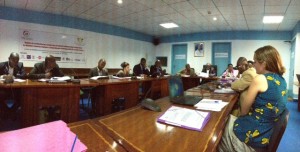Another Nail in the NTD Coffin: END in Africa Project in Cote d’Ivoire
January 30th, 2016
After surviving a very difficult twelve years following the new millennium, including a civil war between 2002 and 2010 and a post-electoral crisis in 2011-2012, Cote d’Ivoire’s health systems are still recovering from severe nationwide health service disruptions. Most of the country’s health facilities (an estimated 52%) were closed during this period. Many hospitals and health centers were looted and still remain in dire shape, and there is a severe shortage of trained medical staff as many health professionals left the country.
However, many international health organizations stepped in after the 2011-2012 crisis to support Cote d’Ivoire’s Ministry of Health and AIDs Control (Ministère de la Santé et de Lutte contre SIDA, or MSLS) in restoring basic health services and revamping the health system in this country of 22.7 million people.
Neglected Tropical Diseases in Cote d’Ivoire
In October 2015, the US Agency for International Development’s (USAID) Neglected Tropical Diseases (NTD) extended its support to Cote d’Ivoire by adding the country to the list of countries supported through its END in Africa project, which is managed by FHI 360.
A recent assessment of NTDs in Cote d’Ivoire shows that lymphatic filariasis (LF) is present in 61 out of the country’s 82 health districts (HD), while onchocerciasis (oncho) exists in 67 HD and schistosomiasis (SCH) and soil-transmitted helminthiasis (STH) are found nationwide (in 80 and 82 HD, respectively. END in Africa plans to assess the country for trachoma. However to date, trachoma has been found in 3 HD. Also, most HD with LF also have oncho cases (54 HD), while relatively few have LF (7 HD) or oncho (13 HD) alone.
END in Africa’s NTD control and elimination activities focus on the five NTDs that are targeted through preventive chemotherapy—LF, oncho, SCH, STH and trachoma. The project began supporting Cote d’Ivoire’s NTD control and elimination efforts in FY 2016. Although Cote d’Ivoire’s NTD program (NTDP) had already been receiving financial and technical support from other NTD partners,[1] this support accounted for less than 50% of the country’s overall needs. USAID is now filling that gap, ensuring that the country receives the support it needs to control of all 5 NTDs targeted through preventive chemotherapy.
END in Africa in Cote d’Ivoire
END in Africa’s main objective for Cote d’Ivoire in FY 2016 is to scale up mass preventive chemotherapy treatments (also called mass drug administration, or MDA) until 100% of the country is reached from a geographical standpoint (geographic coverage). It also aims to improve MDA quality, ensuring that at least 80% of at-risk individuals actually receive the treatments (i.e. so that programmatic coverage is ≥80%). Achieving this objective will also mean helping the NTDP to finish mapping the country for all 5 NTDs. All of these activities will be implemented in line with the country’s NTD Master Plan and will follow the most recent WHO guidelines, protocols and standard operating procedures (SOPs).
FHI 360’s office in Abidjan implements the END in Africa project in Cote d’Ivoire. It is supporting the country in 3 ways: (1) by providing day-to-day support to the country’s NTD program through an END in Africa program manager, monitoring and evaluation (M&E) officer, and finance/grants officer, who have been hired for this purpose; (2) by providing additional support via the regional END in Africa project hub in Accra, Ghana, which has a staff of experienced technical, M&E, finance and grants experts; and (3) by liaising and collaborating with other NTD partners when technical assistance (TA) is needed that is not available through the regional hub in Accra.
In regard to collaboration with other NTD partners working in the country, END in Africa endeavors to avoid duplication of efforts and to ensure that the NTD program receives maximum technical and financial support, and that this support is utilized effectively. As part of these efforts, it helped organize a partner coordination meeting in Abidjan in December 2015, in which the partners agreed upon the areas that each will support, going forward. The also agreed to hold coordination meetings on a semiannual basis. Through such coordination as well as END in Africa’s sustained efforts to optimize NTD control and elimination in Cote d’Ivoire and other countries, USAID’s NTD program has just put another nail in the NTD coffin in West Africa.
[1] The Schistosomiasis Control Initiative (SCI), the Filarial Program Support Unit (FPSU, previously known as the Center for Neglected Tropical Diseases, or CNTD), the END Fund, Sightsavers, and Helen Keller International (HKI) have supported the country’s NTD program.


